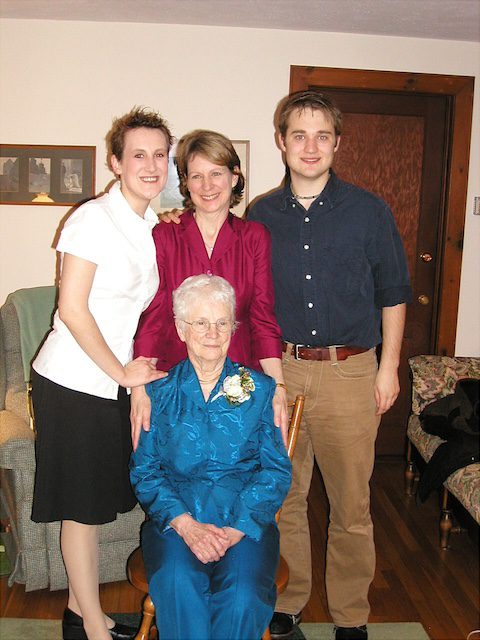My article about reselfing appeared on the Sage Forum Substack on Friday, October 31st.

I called my mother one evening after work to ask whether she’d found an outfit for her 80th birthday celebration. As soon as she asked about my day, I melted into a whiney child. “A hot flash, and I’ve gained weight, and my memory isn’t as good as it used to be, and I get distracted. When does this end, Mother? Do things ever go back to normal?”
After a pause, she replied in a sing-song voice, “Sort of.” I couldn’t help but laugh. Only a child believes that summertime lasts forever.
That was twenty years ago. I’m well into the autumn of life now, and ever-so-grateful that things didn’t go back to normal after menopause. Instead, several first-to-second-half-of-life transitions happened: remarriage, building a house together—both literally and figuratively—relocation, a new career, and a totally unexpected “falling upward” spiritual journey. During those transformative years, which also included the blessing of good health, I discovered my authentic self, the third gift in Cheryl Bridges Johns’ Seven Transforming Gifts of Menopause.
Reselfing defined
I certainly experienced the gift of uncovering, that is, rediscovering parts of myself, as Rachel Campbell wrote in her review of chapter 2, and anger during perimenopause, as Pamela Nichols wrote about in chapter 3. Unfortunately, I was raising two adolescents at that point, and at times, they were on the receiving end. But I was well past menopause before I realized the gift of my authentic self through the process Johns calls reselfing.
Reselfing in actions
Johns identifies five actions that foster reselfing:
- Give yourself permission. Women tend to confuse a healthy self with selfishness and self-centeredness. Johns: “A woman with a healthy awareness of the self gives to others while at the same time remaining aware of her own needs. She knows how to balance human relationships and remain intact. She knows how to balance her responses to demands on her time.” I admit it was easier for me to find that balance of needs, relationships, and demands after my nest was empty and I had fewer birds to feed.
- Provide protected space and time. The maturing process during menopause requires quiet, alone time and lots of introspection. To embrace my authentic self, I had to drop my mask of perfection, stop hiding my less attractive qualities, and be rock-bottom honest with myself. I had to give myself permission to be frank about my warts-and-all self. That gut-wrenching, mind-changing, heart-centered awareness takes time and space.
- Connect with nature. The house my husband and I built is a forest retreat in Virginia’s Blue Ridge Mountains, where we spend our days surrounded by the beauty of God’s creation. When I walk our dogs along the old, gravel logging road, the sights, sounds, and smells of nature free me from my seemingly endless to-do lists, worries, and, as Johns says, ruminations.
- Set boundaries. Johns rightly observes: “Boundary-conscious people are more secure, more accepting of themselves and others. They are not always nice, but they are more frequently kind.” In my experience, nice was often part of my first-half-of-life mask and less honest than the kindness that comes more naturally these days. My mature, second-half-of-life self is more respectful and forgiving of myself and others.
- Give yourself honor. Johns: “Honor is a human right. Everyone needs to be respected and honored for who they are.” I stumbled on this. But then Johns explained that women are often their own worst critics. Yup, my inner critic tells me I’m not doing enough, not measuring up, and the ultimate, not being enough, not perfect as I should be. Not, not, not, not. Nonsense. To my thinking, rather than honor and esteem, we women need to extend patience, kindness, compassion, and gentleness not only toward others but also toward ourselves. Can I hear an amen?
Reselfing in faith
The other sentence in this chapter that gave me pause: “Another word used to describe the self is ego.” The word “ego” means one’s sense of self-esteem or self-importance. So, when Johns asked this end-of-the-chapter question, “How is menopause reselfing different from selfishness?” I balked. Our egos tend to put ourselves before God; that’s the definition of selfishness. We want importance for ourselves, attention and approval, pleasure, independence, to be right and in control. That said, our egos can be selfless, too, naturally in the image of God, but more often with the awareness of our selfish nature followed by Thy-will-be-done-and-not-mine humility. Perhaps that’s what Johns meant to convey by contrasting reselfing and selfishness. But my question is: How is menopause reselfing similar to selflessness?
As Jesus said in Matthew 10:39, Whoever finds their life will lose it, and whoever loses their life for my sake will find it. To reself is a “less me, more Jesus,” losing your life to find it process. My “falling upward” spiritual journey included painful years of the old me dying. The person who’d shed blood every month and gave birth twice had to die. The person who’d made zillions of teaching and parenting decisions, drove endless carpool miles, and baked uncounted dozens of cookies had to die. The person who’d sacrificed in order to gain the illusion of control, success, and safety—she had to die. Death of self to find my authentic self is what I experienced during those twenty years after I asked my mother about going back to “normal.”
In loving Jesus and following his example, He becomes a growing part of our self-image. We esteem Him rather than ourselves. This is the authentic gift.
What is your view of reselfing? Please share your thoughts in the comments.
Notes from Vanaprastha Podcasts on my YouTube Channel: https://www.youtube.com/@CaroleDuff



0 Comments